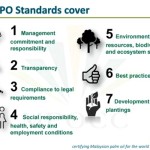Protecting Trade in Palm Oil
 Malaysian palm oil is sought across the globe for its diverse applications, guarantee of sustainable production and eco-friendly credentials that responsible users seek. However, a number of obstacles hinder its entry into certain markets.
Malaysian palm oil is sought across the globe for its diverse applications, guarantee of sustainable production and eco-friendly credentials that responsible users seek. However, a number of obstacles hinder its entry into certain markets.
To remedy this, Malaysia and its industry have the option of applying to a number of fora to seek the lifting of barriers as the most desirable option for all stakeholders.
Multilateral forum
The World Trade Organisation (WTO) deals with international trade and the regulation of market access. With 161 members, its decisions have important implications across the world, impacting both large multinational corporations and small businesses.
The WTO builds upon a series of rules aimed at liberalising trade. Importantly, it has an efficient and reputed dispute settlement system in place. Its institutional structure includes a number of technical committees that oversee the implementation of the various agreements.
As a member, the Malaysian government can raise concerns and trigger discussions in the relevant committees on measures envisaged or adopted, as well as seek support from other members. Of particular interest to the palm oil industry are the:
- Committee on Agriculture, which discusses issues on the implementation of WTO rules on agriculture
- Committee on Technical Barriers to Trade, which oversees mandatory technical regulations, standards and conformity assessment procedures
- Committee on Sanitary and Phytosanitary Measures, which deals with measures concerning food safety and animal and plant health
Accordingly, the Malaysian palm oil industry should ensure that its legitimate commercial interests and concerns are heard by the relevant governmental stakeholders. These could be transformed into specific trade concerns and technical/legal questions to be raised by Malaysia’s representative at meetings of the relevant committees.
An additional tool is available to members to seek redress of alleged violations of their rights under WTO law. As in the case of technical discussions, disputes are formally brought by governments, although they are supported by the industry affected by the measures.
If Malaysia lodges a complaint and if the WTO finds in its favour, the respondent member needs to bring its legislation into compliance with the WTO rules. If the member fails to do so, it must offer compensation to Malaysia or face the retaliatory measures that Malaysia would be able to take.
The WTO dispute settlement system also allows for members to join efforts in commercial disputes, either as third parties or as co-complainants. The Malaysian palm oil industry should, therefore, stay abreast of related disputes triggered by WTO members.
Plurilateral agreement
An important group of WTO members is currently engaged in parallel negotiations for the definition of a plurilateral Environmental Goods Agreement. It aims at promoting green growth and sustainable development by liberalising trade in environmental goods.
Negotiations are being conducted by 17 members (Australia, Canada, China, Chinese Taipei, Costa Rica, the EU, Hong Kong China, Iceland, Israel, Japan, New Zealand, Norway, Republic of Korea, Singapore, Switzerland, Turkey and the US). These countries are, therefore, in a position to drive the whole liberalisation process.
Malaysia is currently not part of the negotiating process. This likely explains why the proposed goods do not thus far include palm oil, despite being a ‘green’ product by definition – i.e. available in nature and which can be used, inter alia, for renewable energy production such as biofuels, which provide for substantial emission reductions when compared to fossil fuels.
Bilateral negotiations
Malaysia could address specific trade obstacles through bilateral negotiations with trading partners. Based on a carefully designed strategy, negotiators can obtain deals that effectively maximise benefits for the domestic industries of both trading partners.
Malaysia and the EU are at present revamping efforts to negotiate a bilateral Free Trade Agreement (FTA). Malaysia could propose a dedicated chapter or annex on vegetable oils. It would address trade obstacles hindering access of palm oil to the EU market, including the illegal ‘No palm oil’ labelling campaign and, possibly, specific taxation schemes.
The annex could also tackle the provision of a certification scheme for sustainable vegetable oils, ideally centred on the Malaysian Sustainable Palm Oil standard. Including such a mechanism would effectively address problems caused by public and/or private measures that are allegedly grounded on sustainability-related reasons, but which are highly detrimental to palm oil.
Platforms for direct outreach
The Malaysian palm oil industry should be sufficiently active in the media. Specialised and general publications, as well as television and radio programmes, are priceless platforms that can maximise outreach.
Not to be forgotten are social media platforms. Adequate information should be systematically fed to educate users on the real aspects of Malaysian palm oil. Social media activity and active consumer involvement are ways of enabling responsible consumers to tell the truth from orchestrated lies about palm oil.
There are plenty of platforms where the industry needs to pro-actively intervene in order to defend the interests of palm oil. None of these should be disregarded, for each has a different nature and pursues different aims before a different audience.
FratiniVergano
European Lawyers










Leave a Reply